(NOTE: I read this piece and recorded it for those needing a little break from reading. Please listen or read, or read then listen, or however you want to take in story/art. You’ll find some prompts at the end — maybe that can stir some writing within you).
<><><><><><>
Cleaning bricks.
“those stones will be held sacred because our hands touched them”.
<>
I’ve been cleaning bricks for days in our new home.
First you take the shop vac with the wide brush attachment and you vacuum them. Using an upward pushing motion to loosen the debris, and then a downsweep to suction up and push anything that isn’t sucked up toward the floor. The brush loosens not just dirt but old drywall dust that has accumulated in the last few weeks as walls were demolished and then slowly rebuilt. You have to be gentle. The bricks insist on it. They are 157 years old, but even older than that when you think about it– because they are the earth. They are the literal earth turned into compact blocks.
<>
In the last 25 years I’ve lived in five different states and in 20 different houses.
I’ve lived in 4 different houses over the last 5 years.
The name of this newsletter— “Notes from Wherever We Are” — is mostly because sometimes I have no idea where I am.
There have been mornings I would wake up feeling disoriented and needed to scan the room to remember. Yellow curtains. Green rocking chair. Bedroom in the sunroom. And I would remember which house, which place, which iteration of life I was in.
People always ask why we moved so much. I wish I had a better story to tell than we just had to. When I began to understand ancestral trauma and patterns, I thought maybe it was the flee instinct in me — remembering my grandparents and how they fled their lands, and that experience just repeats within me, like a skipping record. But mostly we had to leave because of economics. Boring old capitalism is the reason.
I tried to see it as fun, an adventure. But then it got really old. There is exhaustion in moving. It takes such a toll on the body and the family. It sucks resources from every direction. Sometimes you are just floating, wondering: where the fuck am I?
But we’ve done a decent— not good, not great, but a decent being the home our children needed. And, every time we’ve moved, it’s always been some kind of magic— like the right house found us serendipitously. What I mean is, we have always been carried. Cared for. Or at least that is how I like to look at it.
We bought a home less than a year ago. Home ownership is a privilege. An exhale on the body. Who would have thought half my anxiety was due to feeling like I was going to have to leave again, that any moment someone was going to tell me to get out?
This house, the one I am in now, the one we just bought was originally built for nine nuns and a priest’s mother. The priest moved up from New York City to build a church here, nestled against the Hudson River in a small port town full of tug boaters. The nun’s smoked meat outside for the local boaters, there are remnants of a brick smoke house, now crumbled. The stairs of the house are worn in, imprinted on the edge from years of constant climbing. I imagine the nuns going from the basement to gather the coal, and walking the flights of stairs numerous times a day to keep the house warm.
In this house I get up early. I light candles on the dining table and I write. I wake up not wondering what home I am in. I wake up, open my eyes to look out a window and there is a river out there looking back at me and a line of orange that also is pink just above the horizon telling me it’s a new day. I am located. I have landed.
This home is made of bricks and we exposed them inside the home, so most of our interior walls are brick. I am obsessed with them. Not just because of the aesthetic — which is indeed sexy — but also because bricks are earth. And also because someone gifted their bodies to lay these bricks, one by one.
Who were the people who mined and made and laid these bricks? I have come to care about a group of (most likely) men, somewhere in the 1870s, who made this home. Who were they? I can see them as I look at the walls, on ladders, with mortar, maybe a little coppola hat on, their hands cracked. Their faces— light brown but covered in dust. Their lunch, a hunk of bread and a chunk of soprasatta. Giovanni, Francesco, Paolo, far from their original homes, laying these bricks. Their citizenship status— debatable.
The entire time I was moving around, uprooting and barely rooting and uprooting again — I was obsessed with homes.
I was obsessed with homes because I wanted to live in one that was mine but also how they were built, how the windows were placed, how the light entered, the feeling of the floor on my feet, how the heat moved through the home, how it stayed cool. Who lived in there? Who imprinted their stories in there? Who designed it? And more than that— who built it? Was it solid? Could it hold me through an earthquake or a fire?
The most beautiful thing about a home isn’t really the owning of it - but how there were people who dropped their spit and skin cells and breath and tears and blood and pain and pride inside the materials of homes. My god, to build a home is a lot.
<>
Don’t let me fool you– in case I have. I am cleaning bricks, brick by brick, layer by layer, and have been doing this for days — but I don’t do physical labor on homes, or really anywhere. Besides the minimal domestic cleaning I have gotten away, and the pushing out of children, I don’t do hard labor, ever.
When I say cleaning brick – it might not sound laborious, but it is. It's the whole body. My back aches. My knees crack and pop as I squat and stretch to get those hard to reach places. My arm muscles are sore from being lifted over my head for hours at a time. My eyes dry and vision slightly blurred from all that debris falling on my face. My whole body kinda itches from whatever was falling from those bricks on to me. I try not to think too hard about what it all was. I wondered when the last time anybody cleaned these bricks?
As I clean them, I watch my husband run circles around me re-building this home, carrying materials on his back, his ankles swelling, sweat pearls across his forehead, some kind of black dust seeping into the pores on his nose and cheek, like a warrior marking. I know he feels like that. The clock is ticking and the money is disappearing and all he has ever wanted was this. To pour sweat and blood into a home for us. I am watching Ruben, Eric, Marco — guys from other job sites he’s worked at — refinishing flooring, re-doing plumbing and electric, laying drywall with mastery. They ascend and descend the narrow steep stairways of this 4 story home 10 times in an hour. Cumbia music fills the house. I bring them Italian subs and Arizona Ice Tea on our breaks. All their citizenship status— debatable.
I think about the brick layers from 157 years ago who began this. And I think about these folks now who are allowing it to live on.
I lift up, reach higher, squat down, move side to side, cleaning these bricks.
There is no work I respect more in this world right now at this moment. These workers. All the workers. Not only do you need endurance, you need craft, talent, and skill. Not only do you need skill, you need devotion– you have to love it. It’s like cowboying. It’s a suffering of the body you have to love. And you have to be really good at it. And all these guys here have all of it. They love this, and they are fucking good at it. And their bodies are indeed the sacrifice. So we can live here.
<>
The last home we lived in, the one before the one I am in right now, was quite literally falling apart around and underneath us. Not because it wasn’t a good home, but because people stopped taking care of it. The home had become a transaction for them. There were snakes getting in through the floorboards and the kitchen counters were collapsing from mold and the tally of mice in traps was up to about 10 every morning. The house was probably the coldest, and also hottest I have ever been in. In winter, some corners were 10 degrees. In the summer it could get up to 100 in our bedroom. There were only two rooms in that house that both stayed warm in the winter and cool in the summer — and they were the original parts of the home, before the additions of the current landlords. But as much as the home was a shit-show. We loved it. It was by far our most expensive rent to this day — and the worst living conditions we ever experienced— we still loved it. And we tended to spend most of our time in the parts of the home that the original owner/builder built.
We loved it because of Joe. Joe Pollino*. We made a real relationship with him.
Joe was long dead but was who built the original part of the home. Joe was a skilled mason, and those couple of rooms he built were so solid. He left a trunk at the house that was being used as a TV stand that had departure stamps from Napoli, Italy from the 1920s. He was an immigrant. Or his parents were. He must have learned masonry in Italy or from the first layer of Italian masons that landed in NY at the turn of the century and laid the streets of that city.
He built this massive hearth in the center of this home, made from stone from the land the house was on. This hearth was huge. I could crawl inside it and lay down in it. The fires in there — as my daughter says — were a vibe. The story goes— Joe was from Brooklyn, by way of Southern Italy, and he built this place in the 50s —- maybe after he got a little nest egg together. His upstate getaway. Maybe he’d go up there to hunt. Maybe he’d cuddle in front of that stone hearth with his wife or girlfriend. Maybe they played cards until late, drank whiskey or brandy, listened to Frank Sinatra and had sex right on that original wood floor he laid in front of a raging fire.
Joe became an ancestor to us. We could feel him in this home. And we knew he could feel us. The thing with this kind of relationship is: when you know that the spirit of a place also is very aware of your presence — it becomes reciprocal. It’s not just us feeling him, we had to know he felt us, too.
We made an altar for him on that mantel. We gave him tobacco and whiskey. We were sure Joe liked to smoke and drink. We brought every Saint Joseph statue and image forward and offered them around the house. We figured if Joe was born in Italy, or even of the diaspora, Joe was Giuseppe. And he was named after the Saint, no doubt. We got to know that Joe like when I made a slow sauce on Sunday with short ribs. He didn’t like when the “landscapers” came and ripped down all the mugwort and mullein and lemon balm. Joe liked it when we played old crooners tunes and watched for fireflies in the yard in July. Joe appreciated it when I offered some tobacco smoke in the early morning, before the sun rose towards the garden he built.
This house was both a hard one to land in — because it was absolutely falling apart, full of disrepair, neglected— but also a hard one to leave. We became attached to Joe. We wanted to “save” that house so badly. To buy it. To restore it back to Joe’s vision of care and beauty. We wanted to let Joe know his work was not done in vain. Because if we didn’t, that house was going to fall down in a heap. We wanted to make Joe happy. But Joe had different plans for us.
That’s how it happens when you spend time being in a relationship, with anything, but with a home. The spirit of the home relates back to you. They sometimes throw you out. Make you leave. And usually for your own benefit. That’s what Joe did.
<>
The bricks will crumble right in front of you if you use too much force, push too hard, go too fast. Bricks are earthly strong, but also delicate. Fragile little beings. Especially ones this old. Layered by hand, with such care in the pattern, exquisite masonry. As I am cleaning the bricks, taking turns with the large brush vac and a small hand held brush and paint scrapper, to get the in-between, the small things, I am thinking about the beauty of this craft. And I am thinking, wow, Joe sent us here. And I am thinking— did Joe know bricklayers down here in this port village where I live surrounded by old brickyards? Did he have a family that did masonry here? Or did he, just in this world of the dead, send us to a home that he knew was built layer by layer with skill, with love. The kind masons have. The kind bricklayers have. The kind builders have.
After the brush cleaning, you put on the smaller, plastic suction attachment. And then go over each brick individually to get in the crevices. You have to be careful and thorough over the mortar and the holes between the mortar and the brick- that is where filth lives and that is where everything can fall apart.
You have to be careful when you are cleaning out the filth. The old spirits. The dead stuff. You have to tend with care. But you also have to clear it entirely. You don’t want your brick to carry any of this dust. It won’t be good to live with.
In these small spaces and cracks is where life has dwelled for who knows how long, those edges where they meet windows, where spiderwebs have collapsed, the thin line of right angles where moths got stuck and decayed, and the corners where brick touch the ceiling and thick black is built up of season after season. Sucking up bug carcasses, dog hair, dried leaf remains, old energy, dirt from ages ago. And then I move on and use a soft damp rag with a small amount of cleaner. I washed each brick, brick by brick, by hand. You have to squat low to get the ones that meet the floor and you have to use a small ladder to get the ones that are above your reach. But I washed them like I would wash my little ones. Gentle, but with enough grit that the scum between their little fingers would get clean. I wanted these bricks to be down to their essence, who they were when the layers made these patterns, and brick by brick, built a home.
<>
Look around you? Do you see beautiful (and old) structures made of stone or brick? Do you see a bridge? A road? A barn? Do you see food that was grown in a field? Someone put their body on the line for that. Someone was so good at what they did that the house is still standing to prove it. Someone broke a bone, twisted an ankle, tore a muscle, for us to experience this craftmanship. Someone died because of it, ensuring something was built, also so they could turn their labor into flour in their own pantry.
Typically I rush through work of this nature. I don’t enjoy it. I never feel I am any good at it. I am awkward. Clumsy. I trip over things. I can be a bit half-assed. I don’t like to strain.
I am also doing a lot of this work at the top of a very narrow staircase, which descends only inches behind me. I do the best I can not to fall down backwards.
I rush things like this because I want them over, I’m impatient for the outcome. I’m American. This is one of the many ways I lean into the future without sinking into what is present. I see the outcome and want to move forward. This is not how a builder builds, they have to stay with what is in front of them. I was rushing as I was cleaning the brick. And missing a lot.
But, by wall number 2, I slowed down. I have done this process on at least 7-10 very large walls with a lot of dirty bricks– but by wall two, the bricks were literally speaking to me. I noticed that I was not getting all the dirt off them, and drywall was still stuck on many of them. I’m not doing a great job, I think. And I hear:
Slow down. Take your time. Someone made me.
They said Brick by brick. Don’t skip. We lived with each other every year. We hold everyone. This is why the house still stands.
They were not words I heard. It was something that sensed throughout me. Although my husband swears he heard a woman’s voice over his left shoulder the other day while he was cleaning the kitchen “job site”. She said a simple high pitched thank you. Perhaps it was the nuns.
But the bricks, they were not only the ghosts of the nuns who used to live here. They spoke a collective communion with me, in layers of something, a story of visuals, a feeling, that made me stop and realize how holy a process this was.
<>
Two homes ago, the one before Joe’s house. The last one we lived in across the entire country before moving to NY, was on 257 acres of land. That land was part of the Oregon Donation Land Claim Act of 1850. It encouraged settlement of the Oregon Territory to those who were living east of it. Pioneers could claim up to 320 acres per person. 640 acres per couple. What this meant was the government stole land from indigenous tribes and passed it to white settlers for free, to entice them to move there. And they moved there.
The home was a beautiful Victorian farmhouse just south of Portland in the Willamette valley. It had copper sinks. A claw foot tub. A marble counter. It was green and had stained glass windows. A wood burning stove. Two covered porches. It was across the street from this place which I will call Montrose Farms** (they sell landscape plants, you have seen them at Home Depot, Walmart, all the big stores with garden centers). Oftentimes rivers of neon green foamy run-off would flow down their ditch towards the beginning of our street. I didn’t drink the tap water there. I was worried about growing a garden in that soil. It was a horrible feeling, and probably not an uncommon one in so many places. The landlord also leased part of the land near the house to a farmer who grew feed for some kind of animal. A few times a season a sickly smelling spray would come down like a rainstorm from the sky and cover the field next to us. We were told to stay inside for “approximately 5 hours” after the spraying. The landlord had the money to make sure everything was going smoothly in that old house— and she did a good job— but when I asked her about the water and the pesticide spraying down, she said “oh I never thought about that, does it bother you?”
We took care of that old house. We raised ducks there. We tended to an apple orchard. We asked the pest control guy who would come and spray the house for mice and spiders to pretend to do it, but please not actually do it. And he agreed. We sat by the creek that flowed way behind it down the hill, the creek you couldn’t go in because of the agricultural pollution that surrounded us had made it a superfund site.
The landlord of this house saw my signature at the bottom of an email that I wrote to her once saying the rent was deposited. She opened my website that was at the bottom of that email, apparently. She emailed me back and asked me if I would connect with her ancestors that were all buried there, somewhere in the woods. She was a white liberal/progressive lady from Portland — and it was her great grandfather that was deeded the acreage from that land trust— for free. The house and land rentals, plus the newspaper her family had founded 100 years before, pretty much supported her entire life. She asked me to do a ritual there. What kind? I asked her. And she said “well, the kind that’s healing, my family really needs it”. I appreciated that she understood that — I could tell something was shifting in her— but I knew that was her work to do, not mine. Even though of course I was going to do it anyway, I was already doing it, daily.
I emailed her and asked her to consider donating some of the acreage back to the confederated tribes just down the way. But she never responded to that. I spent a lot of time with her dead great grandfather — being with him in that house. He told me to be outside. And that is what I did. The house had some pretty unruly ghosts. But that land was alive and aching. The land was… otherworldly. The land was a song of beauty and grief. The property was surrounded by vineyards and cattle fields and industrial agricultural production. Most of which my landlord sold off to these entities. It was such a beautiful place to be, and also, was being poisoned.
That land held me and I loved every bit of it fiercely, especially that creek behind the house, which I sang to almost every morning.
On that land I was able to grapple with myself— my lineages, my ancestors — being there and sinking deeper into the invitations the land was asking of me. The land, at one point, and I remember the moment, I was sitting with the anemones that were growing like wild all over the back. I was watering the tomatoes. I was enjoying the early morning July sun. The land told me to go back. To where my family landed two generations ago. Go east, it said. I wanted to stay there, I really did— but it sent us to NY. It was bittersweet. They sent us to Joe. And to an area near where my Italian grandparents arrived, workers from the old country— part of turn of the century labor class who helped build this entire state.
<>
I think of the people who owned those homes I lived in, rented. I don’t think of them as I do the people who built them. None were devoted to the homes — they were devoted to what the home could give them. And not that there is anything wrong with wanting money in exchange for a service, a home. That is not what I mean. I mean that isn’t all there should be.
I was cleansing history as I cleaned these bricks. I was cleaning the earth that was formed and shaped to build this home. I was tending to the laborers who made these bricks.
I began staring into the void, into the bricks, cleansing a mostly unknown past, and clearing for a very unknown future. Each brick riddled with small chips, chunks missing, the absence of brick particles making patterns all of their own. I noticed their personality. Their way of being, their slight tilt and curve, their own expression of earth, hands, machinery, fire and the imprints of those that touched them before me. How the mortar on some covered half the brick in repair, ensuring its placement in the order of the house. I was more careful when rubbing them clean.
At first I tried to reveal the original coloring, that burnt orange. I wanted that orange! But there were many layers of life over these, which browned them. Aged them. Their color was the color of now, this iteration. It wasn’t about what I wanted, it was about what they were.
I don’t think anyone who lived here ever even saw these bricks, this house probably always had walls covering them. Besides the makers of brickers and builders of the house, we may be the only people seeing them. I feel we are revealing something here. The ways someone wove a home— the skeleton of its existence.
These particular bricks are laid in an old italian method, versus Dutch or other styles of Europe, which differs in how the bricks are pressed and also laid out. So we were told most likely it was southern italian immigrants bringing this style here — that laid these bricks. As I wiped each brick, I offered my thanks to them, knowing the attention to detail an Italian craftsman puts into building work. They may have had no idea that one day someone of their diaspora would be cleaning them. Maybe they did. But it didn’t matter to them. They just showed up to the job and did it right. The house is still standing.
I think Joe sent us straight here — to tend to these bricks.
I pressed my ear against the brick to try and make out the prayers that lived in the pores. I whispered my own prayers in there too. I noticed there are little spaces, holes, between some bricks. They will be perfect places to tuck away paper prayers.
The bricks may hold the imprint of the ghosts, small granular matter of what was before. They hold residue of salty river water, because in this part of the Hudson River, where this home is against, is brackish waters. For about half its length, the Hudson is actually a tidal estuary, where salt water from the ocean combines with fresh water from northern tributaries. These bricks are made of land, hands, fire, death, prayers of nuns and mothers — of salty tears of grief and joy.
They are everything they captured that lived around and within them.
<>
Every home we had was a sacred place that held us well. We knew that moving into a house meant becoming good guests. Not for the landlord’s sake — but to be good guests for the home, the structure and quality and beingness that it is.
We saw houses— and this may have everything to do with living in — and moving from — so many of them — as alive, as breathing, systems, with multiple spirits and personalities. And we saw these houses not as commodities owned by our landlords. But structures that people carefully (and sometimes not so carefully) put their bodies on the line for to build. That each piece of wood was a living tree. And every slab of granite was a mountain. The plumbing moved water, holy water. And even in the most toxic or plastic home building materials that may have been used — someone, many people, laid it all out so a home could be born.
What I think about when I think about all those homes is not only what happened within them, but who they were, and they contributed to who we were.
We have “achieved” that thing: homeownership. Which was very transactional in its nature.My elderly mother-in law- actually read an essay here a while back and was upset that I made it seem like “we bought the house” when essentially she did. She gave us the money to buy a home that she could also live in, and now she lives underneath us in an apartment we created for her. Her money bought the house. But our bodies made it livable. So who owns this home? It’s a question to ask. Who actually owns things? The ones that buy them in a transaction or the ones that bleed to make them livable, that sing the songs into the walls?
I wish we had a story of we saved and saved and now we did it!. How do you save when every last penny is used to survive? We work really hard — but buying on our own was still impossible. It was impossible to do it the way they say you could do it. Work hard! Save your money! I needed a mother-in-law who also had a need. That’s how it’s done. Don’t be fooled. If you can’t save the money to buy a home, no matter how hard you work — it isn’t you. It’s them.
We named this home Casa di Sant’Anna, in honor of those 9 nuns who were devoted to Saint Anne that lived here. The brickplate “STE Anne” still lives right at the top front of the home, above the window on the widow’s balcony, where a wife is meant to stand and wait for her boater husband to come up the river, back home— if he does. Saint Anne was Mother Mary’s mother. Anne is the protector of all mothers. Sant’Anna, I like to think, owns the home. The bricklayers own this home. The spirits they all conjured within the mortar owns the home. We are just guests.
I feel at home here. Even if I didn’t ”buy” it, it isn’t about the transaction. It’s about the spirit of the place.
I feel the nuns, yes, in case you are wondering. But I feel a lot more, too.
<>
I am cleaning a 157 year old altar. Made of cells from people’s hands. Made of animal and plant compost. Of sunrises and sunsets. And full moons. Of the ancestors of this land, the Esopus. Made of revolutions that were fought right here, in this location.
As I clean I am adding my own cells, my skin sloughing off, tiny bits of my finger nails that scrape against it, my breath, my ache, my gratitude. I am now part of these bricks. And my family will be imprinted within them, too. They will, I hope, keep us sheltered.
These bricks were alive. How could they not be? How can anything not be? Creation is creation.
Who am I to rush washing them? Who am I to do it only to get to the other side, the result?
Who am I not to consciously bring my hands across them like a pilgrimage, a prayer for the people, for freedom, for peace.
I have the opportunity to bless this space. To reverse the transactions. And to instead, make relations.
By wall 5 this has become an act of devotion. I developed a rhythm to my body. The labor part doesn’t get easier, but it becomes more mindful, dutiful. I am aware of my body, of where it should move. I am aware of my space, and where my flesh meets the floor and where my hands meet the walls.
I am aware of each dead fly I have to sweep away and suck up through a tube.
Brick by brick I said I am sorry. Brick by brick I said thank you. Brick by brick I cleaned, in that deep way, the mother gut way, the kind of way there are no prayers or words for there is only the body spell, an altered state. I think the Japanese call is something, Satori.
And now I am within these bricks. Part of their sacred journey to being laid, to becoming shelter, to holding the stories and now we are part of the story to hold them so they can continue to hold others. We hope that the love and pain we pour into this home, allow it to live another 157 years. We hope someone, one day, will wash these bricks in gratitude.
As I was writing this down, just jotting down thoughts, my husband sent me this:
These stones will be sacred because our hands touch them.
<><>
What will you touch today and remember this? What are you tending to that has been passed on, or asking to be passed down?
How can we honor space, spirit of place, spirit of home, and spirit of those who built our homes, as we enter into the holy week?
Ancestral work, once you have been doing it for long enough, just becomes life. It’s a lot less simple (and deep).
What is transactional that needs to be relational?
You don’t need a batch of tools or oils or magic or anything. You just need your body, and your willingness to believe that the ancestors are everywhere, all around you, and within all things around you.
How might we walk differently understanding that our dead, our guides, our saints and angels are infused in every brick, every antique cabinet, every plank of wood floor, every roof, even within the candles we burn. How might we consider “ownership” when we consider the hands that formed things we buy?
May we all be blessed with this kind of remembering, every day, in our lives.
*Name change to protect and respect the identity of the house
**Name change to protect and respect the identity of the house
If you have made it all the way to here:
<><><>
Come write wild, liberated, sensual words with me in SICILY. A 6 days writing immersion for all kinds of writers in Palermo. LEARN MORE HERE
Or — become a paid subscriber and come to our deep winter writer’s retreat on zoom on 2/23
XOXOXOX MB

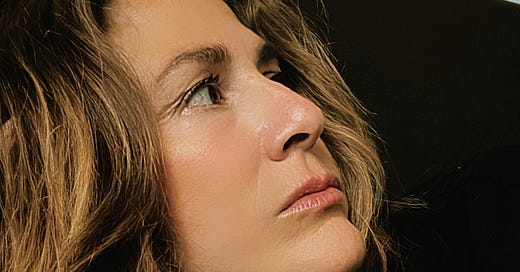


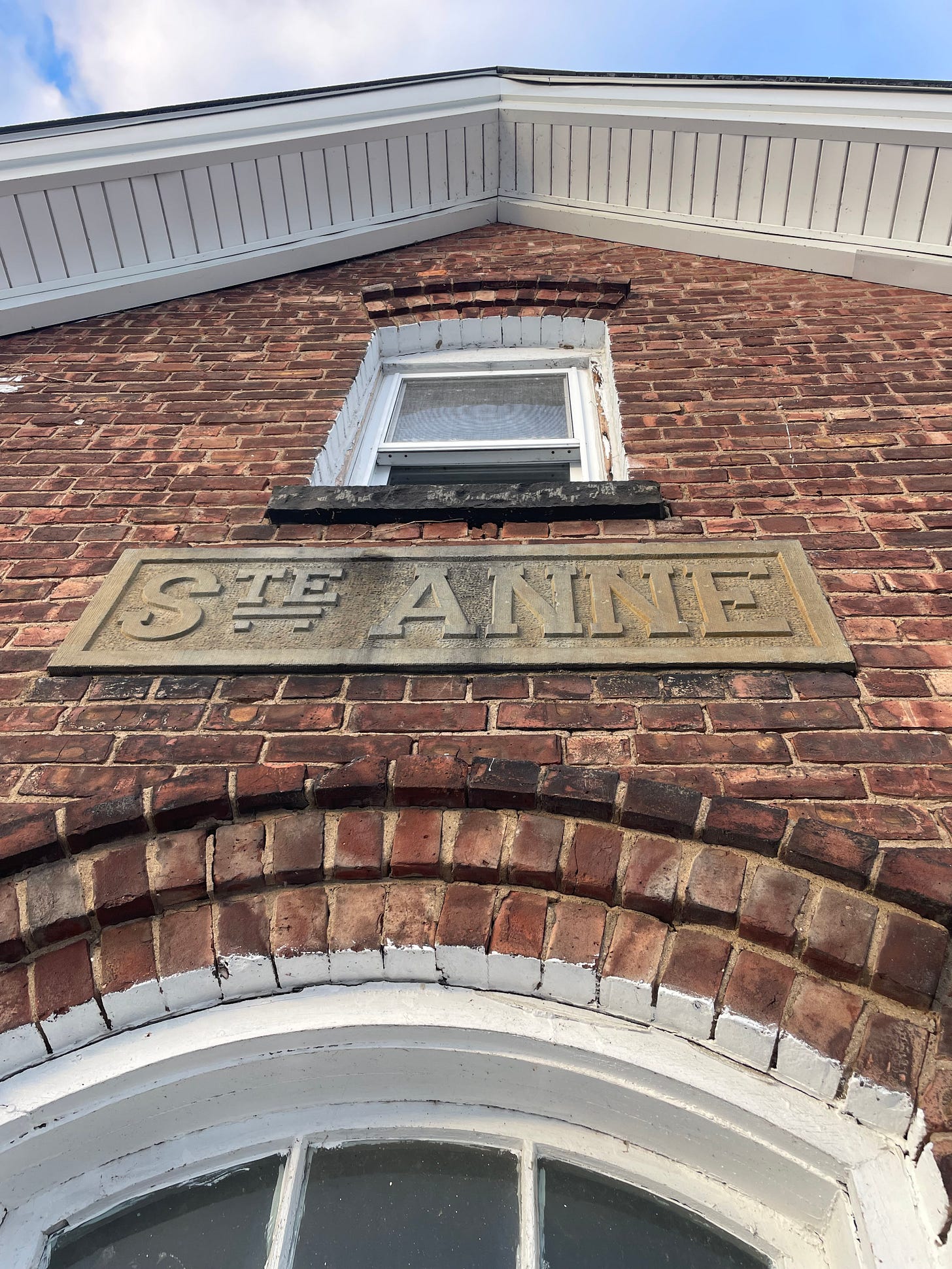

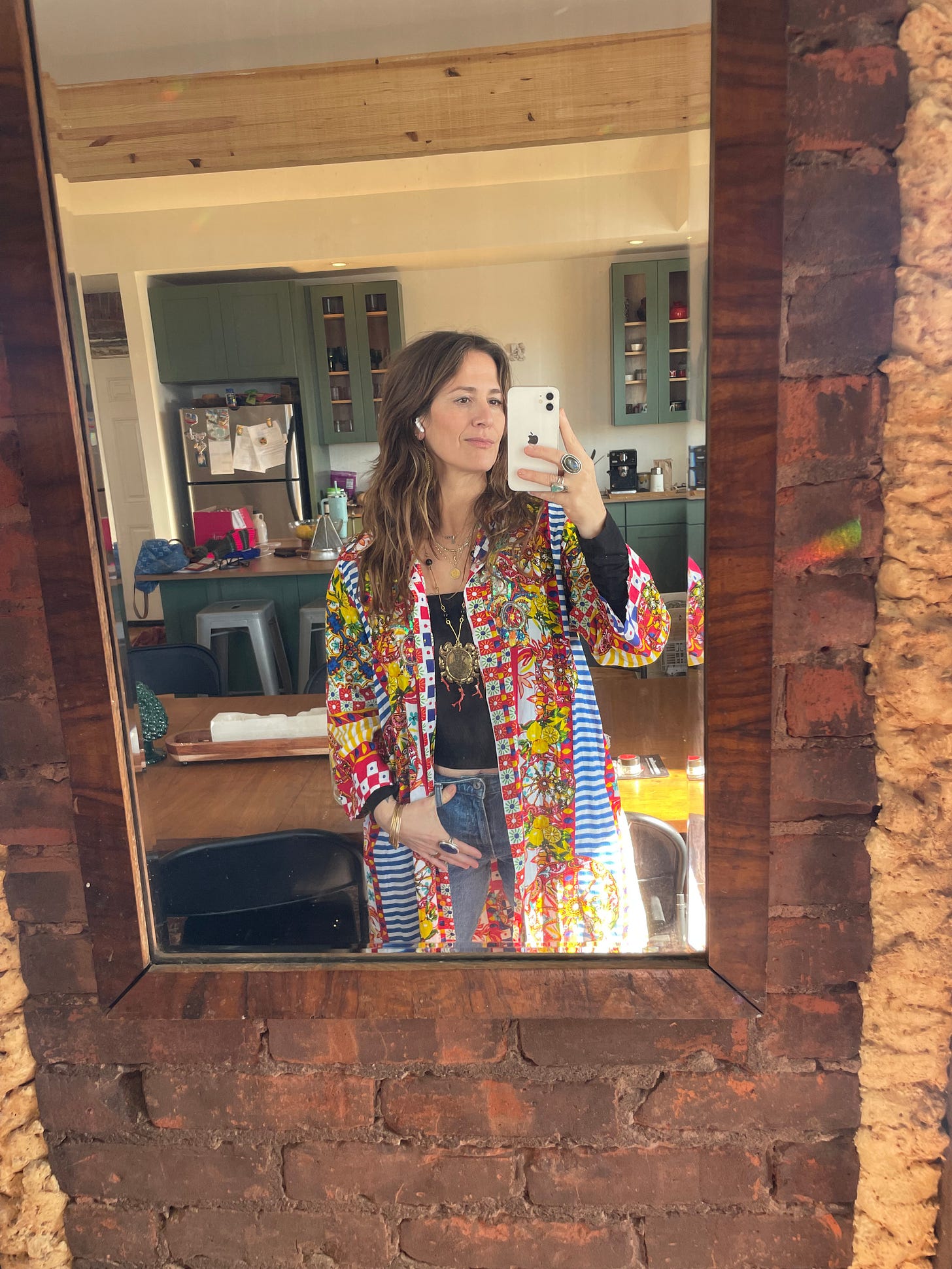


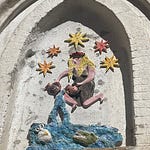




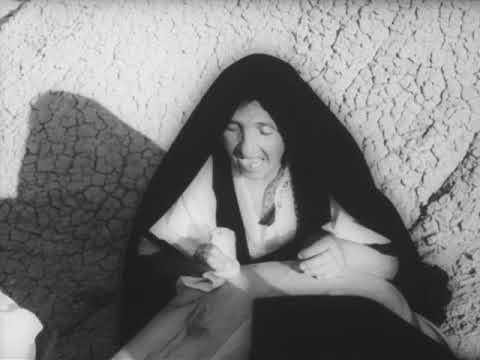
Share this post